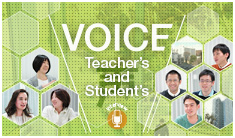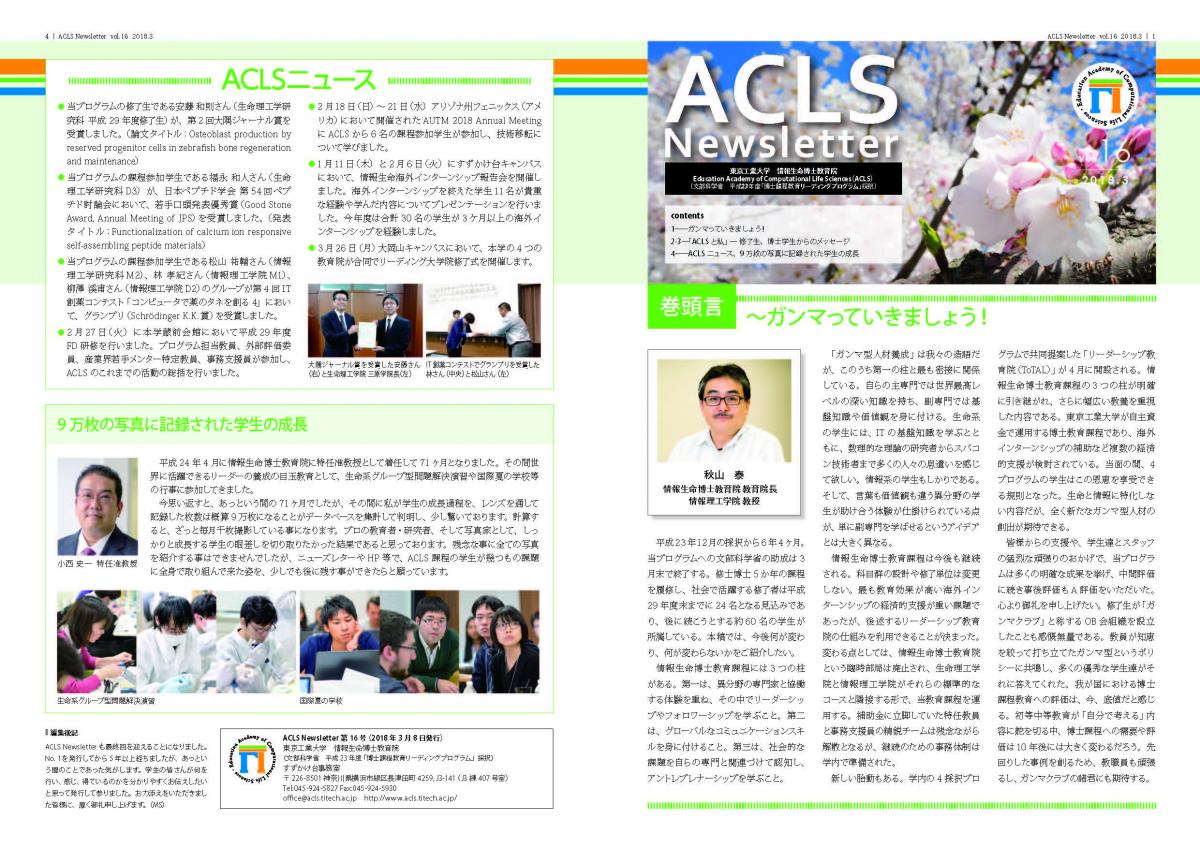- Home
- Teacher's and Student's voice
- Hisakazu Mihara
Hisakazu Mihara


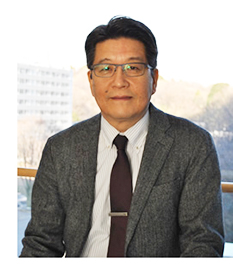
Mihara:In April 2015, I assumed the position of Dean of the Graduate School of Bioscience and Biotechnology from my predecessor, Professor Mitsuo Sekine. At the same time, I also became the ACLS Program Supervisor, a position which had been concurrently held by Professor Sekine. Prior to that, as a member of the Career Path/Overseas Dispatch Committee, I had been involved in planning and review at ACLS since the time of its founding. Program operation at ACLS is handled by the Director, Professor Yutaka Akiyama. Therefore, my role as Program Supervisor is to take a broad view of the entire organization, confirming that each committee and working group is functioning appropriately, checking for problems, and recommending measures for areas which can be improved further.
At ACLS, students majoring in life science acquire basic knowledge in computer science to go with their core disciplines of bioscience and biotechnology, while students majoring in computer science study bioscience and biotechnology as a secondary field. Through this curriculum, the ACLS creates what we call “Γ-type specialists” (gamma-type specialists). In addition to deep knowledge in their academic major, students acquire basic knowledge in a secondary field. The resulting ability to solve problems across fields results in specialists who will be able to perform in society. For example, in the field of drug development, computer simulations has been performed as a common practice. This field of computer-aided drug design will continue to develop even further. Through a curriculum in which students study bioscience and biotechnology with a sub-focus on computer science, we are preparing students to make outstanding contributions in the emerging interdisciplinary research fields.
In addition to the area of drug development, current bioscience and biotechnology has entered the genomic and post-genomic era. For example, during research of proteins, simply calculating a three-dimensional structure will not be sufficient; it will also be necessary to combine that structure with an enormous amount of genome-related information. This means that the power of computers will be more important than ever. Global trends are also moving in the same direction. Even in terms of promoting a certain industry, computer science is essential. Furthermore, IoT (Internet of Things) is one of the pillars of the 5th Science and Technology Basic Plan (Note) of the Japanese government. At ACLS, we seek to cultivate students who possess the ability to make scientific contributions to such society.
(Note) Based on the Science and Technology Basic Act which was enacted in 1995, the Japanese government has implemented systematic and consistent policy for scientific technology through a broad, long-term perspective since 1996. The 5th plan spans the five-year period from 2016 to 2020.

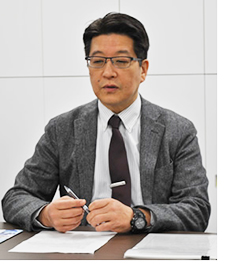
Mihara:All ACLS students are clearly focused on a particular field of research. Students in the program do not suffer a loss in their field of expertise; rather, they receive training which gives them an added advantage. In the case of students not enrolled in the ACLS program, expertise is generally acquired through research at their own laboratories. On the other hand, students at ACLS take seminars and classes which are outside of their field of expertise. Moreover, students in the master’s course have an opportunity to participate in short-term internships at domestic corporations, while students in the doctoral course can take part in overseas internships. This allows students to acquire a large amount of social experiences in addition to research.
An important keyword of ACLS is “international.” Students in the doctoral course are required to participate in an overseas internship lasting at least three months. During these internships, each student uses their own research as a base for conducting broader research and research with a different orientation. Overseas universities also offer many seminars related to entrepreneurship. In countries such as Switzerland, there is a strong partnership between industry and academia. For example, at the Swiss Federal Institute of Technology in Lausanne (EPFL), students eat meals together with corporate employees and have the opportunity to discuss various matters related to an industry-academic partnership. The laboratories where students are stationed during their internships have researchers of various nationalities, so students acquire the ability to engage in brainstorming and discussion with researchers who possess different cultures and ways of thinking. This experience leaves a deep impression on students. The new research environment and experiences are extremely stimulating, to the point that some students even extend their original three-month stay to a one-year stay. Of course, there are also foreign students studying at the Tokyo Institute of Technology, so it is possible to foster international sensitivity even while in Japan. However, foreign students in Japan make somewhat of an effort to conform to Japanese culture and ways of thinking. By actually going overseas and having new experiences, ACLS students are able to naturally acquire the international ability and leadership skills required of today’s scientists and engineers.
ACLS also focuses on career path education via an industry-academia-government partnership. For example, in courses such as Business Venture Promotion, we invite actual entrepreneurs to act as lecturers and teach students how to start a business. Although the ACLS curriculum places a lot of demands on our students, they acquire the ability to perceive society outside of university and become much tougher. Students themselves can feel their own abilities expanding as they tackle the challenges offered by the program.

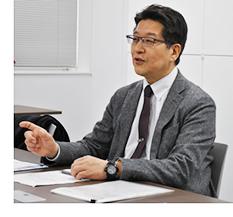
Mihara:At my laboratory, students experience a huge increase in motivation when returning from their overseas internship. They have a renewed desire to attain higher goals and produce cutting-edge results. This is true even for students who possessed great ability prior to going overseas. Another benefit of the overseas internship is that students acquire a high-level ability to give explanations and debate with others. Students also obtain the humanity and leadership necessary to function as scientists and engineers. In the past, after completing the doctoral course, students joined overseas laboratories as part of their postdoctoral research. However, the ACLS is a wonderful program which allows students to obtain both of these experiences at once. To be honest, I wish such a program had existed when I was a student!
Furthermore, we hold an International Summer School every year by inviting overseas lecturers and students from affiliated universities. Students play a leading role in deciding upon the content of the few-days school period, and also handle implementation at site during the school itself. About one-third of ACLS students participate in the school every year. At the first summer school, Japanese students were overwhelmed by the aggressiveness of foreign students and weren’t able to voice their own opinions. Now that the summer school has entered its fourth year (NOTE), current students utilize the experiences of upperclassmen and seize the initiative, engaging in discussion with foreign students on an equal level. The leadership skills of each individual student have increased significantly.
(NOTE) At the time of the interview (2015)

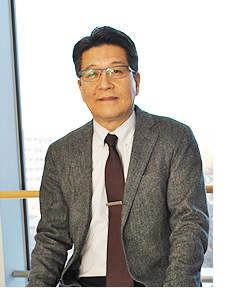
Mihara:There will be no change to the content of the ACLS program itself. However, courses will shift from a semester system to a quarter system. Until now, students acquired credits in about four months while attending classes once per week. After the reform, students will be able to acquire those credits in two months while attending the same class twice per week. Classes will address a lot of material in a short period of time, so it will place greater demands on students. For example, students will now have to give reports twice per week instead of once per week. The merit of a quarter system is that it provides greater flexibility. Students who obtained the necessary credits during the first quarter don’t have to take classes during the second quarter. When combining this period with the two months of summer vacation, students can now use the four-month period from June to September to go overseas or participate in corporate internships. It will make it easier for students to acquire new experiences.
The quarter system will also facilitate response to academic years (grades) which differ by country. This will make it easier to accept short-term students from overseas and will foster an even more international atmosphere at our university. ACLS students with experience in studying overseas can help the foreign students who have come and who would come to Japan, and there will be more opportunities for mutual improvement.

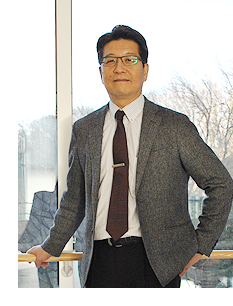
Mihara:Some students are discouraged simply because classes at the ACLS appear to be very demanding. Some students want to participate simply due to the appeal of the scholarships being offered. However, as I have already discussed, the true benefit of taking this program is found in how students are able to heighten their own potential through interaction and competition. As a result, students refine the humanity which is required by society, and cultivate their international skills. I truly hope that students will take advantage of this outstanding program. Once you become a working member of society, you need to have international sensibility, and you will be required to take action while debating with a variety of other people. The ACLS program is designed to equip students with such ability. Although I welcome students who wish to join the integrated training course from the master’s program to the doctoral program, some first-year master’s students are hesitant to commit to education all the through the doctoral program. For such students, it is possible to participate in the master’s course and then make a decision on whether or not to participate in the doctoral course after half a year.
Furthermore, through the ACLS program, students who once spent all of their time enclosed in their laboratory and engrossed in their research have been able to build new partnerships. This is something which we faculty members did not initially foresee. Such relationships foster mutual growth and are of great benefit to participating students.
In the future, there will be a greater need in society for researchers who have acquired their PhD. Conducting thorough research in the doctoral course also gives students an advantage when searching for employment. The high-level skills acquired at ACLS are an even greater advantage. Furthermore, an ACLS education makes it easier to obtain positions of responsibility at a corporation. I truly hope that students will participate in the ACLS program, obtain their PhD, and achieve great things as international professionals in a variety of social fields.
※The content of this article is accurate at the time of the interview, December 2015.






